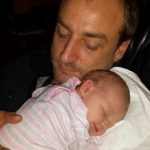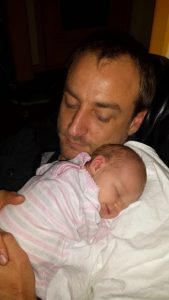Why does my baby want to sleep being held?
Almost every day I am asked by a parent of a newborn “why does our baby want to be held to go to sleep? He just won’t go to sleep in the bassinet”. I explain – being held close reassures baby because his brain is “hardwired” to respond to this position as a “safe” place. Being held, particularly in skin to skin contact, stimulates chemical responses in baby’s brain. The amygdala fires messages to other parts of the brain which regulates baby’s heart rate, breathing rate, and temperature. When these vital functions are normal baby can relax – and sleep. The complex automatic chemistry of these comforting sensations is explained by Dr Nils Bergman “close contact triggers the amygdala to fire another signal to the prefronto orbital cortex – the activation centre for orientation – activating the left side of the brain and the baby reacts by being orientated to approach, in anticipation of reward.” Dr Bergman elaborates further about how development of these brain pathways lays the foundation for the development of the child’s Emotional Intelligence and Social Intelligence (I have included a link to his website below).
Think back to the days of our ancestors and imagine the environment they lived in – predators were everywhere! The safest place for a baby or child was in the arms of an adult. Millions of years have passed but our human babies are still created with the same needs for reassurance and comfort, and thankfully, human parents still have an instinctive response to protect their babies and meet their most basic needs.
Fast forward to baby growing bigger – does the need for reassurance and comfort of a parent’s loving arms diminish? Well, yes – and no. Baby gradually develops the confidence in his environment and caregivers to become comfortable to sleep apart from his parents, but never far away. When he is frightened or uncomfortable he will gravitate back to his place of safety and reassurance – his parents arms. We all know parenting is a big job, and parents need their rest too. Here are some wise words from Sarah Ockwell-Smith – “The gift of being able to get your child to sleep easily, calmly and relatively quickly is a huge one. So many parents struggle with trying to encourage independent naps, I often wonder why the message to embrace non-independent ones is not louder. The two biggest criticisms I hear are “you need to encourage independence, it’s not good for them to be so reliant on you” and “naps laying on mum or dad aren’t as good quality as naps in a cot/crib”. These criticisms are utter rubbish.” You can read more of Sarah’s reasoning and some management strategies for parents’ whose little ones are “contact nappers” in the link below.
In the meantime, new parents, my advice is to embrace your new role by embracing your baby. Not only is this meeting your baby’s innermost needs, your own instinctive responses are being cultured by powerful brain chemistry too. The behaviours of the newborn send sensory signals to the mother’s brain that have a profound effect on her. Skin to skin contact and face to face communication with her baby stimulates the release of oxytocin, the love hormone, which, as she gazes intensely at her baby’s face stimulates the release of even more oxytocin. “A mother’s fear centre is inhibited by high oxytocin levels making her fearless to protect her baby. Working with dopamine, caring for her baby is addictively rewarding as the same approach pathway fired in the baby’s brain is also fired in the mother’s brain”. Close contact with baby nuzzling and suckling at the breast causes the release of prolactin which stimulates milk production, while oxytocin release stimulates the “letdown reflex” enabling the colostrum, and later the milk, to flow as the baby breastfeeds. The mother becomes highly sensitised and tuned in to her baby, enabling her to understand her baby’s signals, needs and wants. This all happens automatically. Fathers are subject to the same brain chemistry activity even though they are unable to lactate and breastfeed, demonstrated by protective and nurturing responses as he supports and cares for his partner and newborn. Parenting is the biggest rollercoaster ride of life and there will be lots of ups and downs along the way. Finally, some words from my book “New Baby 101” -Parents’ expectations about baby’s sleep are influenced by very recently imposed sleep environments and routines which may promise to create a predictable and ordered life with a newborn, however parents are swimming against the tide of human DNA when they try to manipulate their baby’s natural instinctive behaviours. So go with the flow, and trust YOUR instincts – you already know your baby better than you think!
References from Academy of Breastfeeding Medicine: https://storify.com/BFMedicine/dr-nils-berman ; Nils Bergman on The Neuroscience Behind the Skin-to-Skin Imperative #ABM16http://ow.ly/w0c43057J5L
sarahockwell-smith.com/
dad cuddle
Dad cuddle

Dad cuddle



